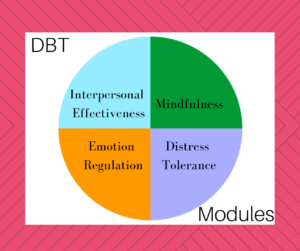Borderline personality disorder can be a very difficult condition to overcome. However, with the help of a therapist, it is definitely possible. In this blog post, we will discuss some of the best therapies for borderline personality disorder. If you are struggling with borderline personality disorder, please don’t hesitate to seek out help! There is no shame in getting the support that you need.
Contents
Defining BPD
 BPD, a popularized term for Borderline Personality Disorder, is a personality disorder that’s characterized by instability in moods, behavior, and relationships. It is a Cluster-B personality disorder, which means it shares commonalities with other disorders in the same cluster, such as Narcissistic Personality Disorder and Histrionic Personality Disorder.
BPD, a popularized term for Borderline Personality Disorder, is a personality disorder that’s characterized by instability in moods, behavior, and relationships. It is a Cluster-B personality disorder, which means it shares commonalities with other disorders in the same cluster, such as Narcissistic Personality Disorder and Histrionic Personality Disorder.
While the symptoms of BPD can be difficult to understand, it’s important to remember that people who suffer from this disorder are not intentionally trying to be manipulative or hurtful. The symptoms are a result of the individual’s struggle to maintain a positive self-image and cope with overwhelming stress and emotions.
There is no one “cause” of BPD, but there are certain risk factors that can make someone more susceptible to developing the disorder. These include a history of trauma or abuse, family history of mental illness, being exposed to chaotic or unstable environments or having a low sense of self-worth.
If you are struggling with any of the above symptoms, it is important to seek professional help. While it can be difficult to face your problems head-on, know that there is hope for recovery. With the right treatment, you can learn to manage your symptoms and live a fulfilling life.
When To Seek Therapy For BPD?
BPD is classified as a mental illness, which means that if you’re struggling with the disorder, you may benefit from therapy. If you’re experiencing any of the following, it may be time to seek professional help:
- Intense and unstable relationships
- Problems with work or school performance
- Self-harm or thoughts of suicide
- Uncontrolled anger
- Wide mood swings
- Fluctuations in self-image
- Impulsive behaviors (like spending sprees, risky sex, or binge eating)
- Difficulty regulating emotions
- Chronic feelings of emptiness
- Sensitive sense of rejection or abandonment
- Engagement in idealization and devaluation (thinking people are all good or all bad)
While everyone experiences some level of the above symptoms at different points in their lives, people with BPD experience them to such an extreme that it interferes with everyday functioning. These symptoms often result in instability in work, school, and relationships.
Moreover, when you feel like you’re constantly on an emotional rollercoaster, it can be difficult to see a way out. This can be an extremely isolating and scary experience.
In these cases, therapy can be an extremely beneficial way to get help. A therapist can provide you with the tools and support you need to manage your symptoms and live a fulfilling life.
Therapy For BPD
While a disorder as severe as BPD may not be “cured,” therapy can help you manage your symptoms and live a fulfilling life. There are many different types of therapy that can be helpful for BPD, but some of the most common include:
Dialectical behavior therapy (DBT)
 DBT, or dialectical behavior therapy, is a type of cognitive-behavioral therapy that was specifically designed to treat BPD. DBT focuses on helping people learn to regulate their emotions and improve their relationships. It is the most well-researched form of therapy for BPD and has been shown to be effective in reducing symptoms.
DBT, or dialectical behavior therapy, is a type of cognitive-behavioral therapy that was specifically designed to treat BPD. DBT focuses on helping people learn to regulate their emotions and improve their relationships. It is the most well-researched form of therapy for BPD and has been shown to be effective in reducing symptoms.
For people with BPD, DBT works by teaching them skills to manage their emotions better. There are several components of DBT, including:
- Mindfulness: This skill helps people focus on the present moment and be aware of their thoughts and feelings without getting overwhelmed by them.
- Distress tolerance: This skill helps people deal with difficult situations in a more positive way.
- Emotion regulation: This skill helps people manage their emotions in a healthier way.
- Interpersonal effectiveness: This skill helps people communicate better and build healthier relationships.
DBT is an evidence-based treatment that has been shown to be effective in treating BPD. It works on teaching people skills to manage their emotions better.
Transference-focused psychotherapy (TFP)
Before understanding how this therapy works, let’s learn what transference means. Transference is the concept of redirecting emotions and feelings towards a different object or person. It usually happens unconsciously. In the context of therapy, it occurs when patients start to develop feelings towards their therapist.
TFP is a type of psychodynamic therapy that was specifically designed to treat borderline personality disorder. The aim of this therapy is to help patients become more aware of their emotions and thoughts, as well as the emotions and thoughts of others. TFP also helps patients learn how to regulate their emotions, so that they can better cope with the stressors in their lives.
For BPD, it is beneficial by helping the clients to understand the emotions they experience and to develop skills to manage them. It also teaches clients how to relate to others in a healthier way.
For example, a therapist may help a client with BPD to understand that their fear of abandonment is often the result of feeling unlovable. The therapist can then help the client to develop skills to cope with this fear. In addition, therapy can also teach borderline personality disorder patients how to have healthier relationships.
Systems training for emotional predictability and problem-solving (STEPPS)
 This is a rather new approach that is making its rounds in the mental health community. STEPPS is a systems-based therapy that focuses on helping the patient’s family, friends, and therapist to understand borderline personality disorder. The aim of this therapy is to provide the patient with a support system that can help them to better cope with their condition.
This is a rather new approach that is making its rounds in the mental health community. STEPPS is a systems-based therapy that focuses on helping the patient’s family, friends, and therapist to understand borderline personality disorder. The aim of this therapy is to provide the patient with a support system that can help them to better cope with their condition.
One of the benefits of this therapy is that it helps to build a stronger relationship between the patient and their therapist. It also helps to educate family and friends about borderline personality disorder, which can be very helpful in providing support for the patient.
The mechanisms of this therapy are still being studied, but it seems to be a promising approach for treating borderline personality disorder.
Mentalization-based therapy (MBT)
MBT, an evidence-based therapy, focuses on improving mentalization or the capacity to understand one’s own and others’ behavior.
Patients learn to become more aware of their thoughts and feelings in order to make better decisions. The therapist works with the patient to help them develop a greater understanding of themselves and others around them. Moreover, MBT has been found to be an effective treatment for borderline personality disorder. A study that followed patients for two years after they completed MBT found that 60% of patients no longer met the criteria for borderline personality disorder. In the process of MBT, patients are also taught skills to deal with stress and emotions. These skills can help patients in their everyday lives and improve their relationships.
Schema-focused therapy
A very different type of therapy, schema-focused therapy, also called cognitive-behavioral therapy for personality disorders (CBT-PD), focuses on changing negative thoughts and beliefs about oneself. Patients learn to identify their negative schemas, or ways of thinking, and then challenge and change them.
For example, someone with the schema “I am unlovable” might challenge that belief by thinking of times when they were loved and accepted. CBT-PD has also been found to be an effective treatment for borderline personality disorder. In one study, patients who received CBT-PD had significantly lower rates of borderline personality disorder symptoms at the end of treatment.
Psychiatric management
 Lastly, psychiatric management is a treatment approach that focuses on medication and other medical interventions.
Lastly, psychiatric management is a treatment approach that focuses on medication and other medical interventions.
While there is no specific medication for borderline personality disorder, medications can be used to treat some of the symptoms associated with the disorder. For example, antidepressants may be prescribed to help with depression and anxiety. Antipsychotics may be prescribed to help with delusions and hallucinations. And mood stabilizers may be prescribed to help with impulsivity and mood swings.
In addition to medication, psychiatric management also includes other medical interventions such as electroconvulsive therapy (ECT) and hospitalization. ECT is a procedure that uses electrical shocks to the brain to treat severe mental illness. It is typically used as a last resort when other treatments have failed. Hospitalization may be necessary for people with borderline personality disorder who are a danger to themselves or others.
Borderline personality disorder is a serious mental illness that requires treatment. There are various types of treatment available, including mentalization-based therapy, schema-focused therapy, and psychiatric management. Each type of treatment has its own benefits and drawbacks. It is important to work with a mental health professional to find the right treatment for you.
Benefits
 BPD therapy and its types have many benefits. While all of them work to improve your overall mental health, there are some that are specific to BPD. For instance, DBT has been shown to decrease the number of self-harm incidents and suicidal thoughts or behaviors. It can also help you better manage impulsivity, emotional outbursts, and relationships.
BPD therapy and its types have many benefits. While all of them work to improve your overall mental health, there are some that are specific to BPD. For instance, DBT has been shown to decrease the number of self-harm incidents and suicidal thoughts or behaviors. It can also help you better manage impulsivity, emotional outbursts, and relationships.
Schema Therapy is another type of effective BPD treatment that can help you understand and change deeply-rooted negative beliefs you have about yourself. This, in turn, can improve your self-esteem and emotional regulation.
Apart from these benefits, therapy for BPD can also help you develop healthy coping mechanisms, set boundaries, assert yourself, and learn to trust other people again. It is also a space for you to process traumas and work through your emotions in a healthy way. All of these benefits can lead to a more fulfilling and satisfying life.
If you are struggling with BPD, know that you are not alone and there is help available. Seek out a therapist who specializes in treating this disorder and start on your recovery journey!
Things To Consider
If you do think that BPD therapy can be beneficial for you, there are some things you should consider before starting treatment.
- First, it’s important to be honest with your therapist about your symptoms and what you’re struggling with. In order for therapy to be effective, you need to be open and willing to change.
- Second, BPD therapy can take time – it’s not a quick fix. You will likely need to commit to weekly sessions for several months or even years.
- Third, BPD therapy can be expensive. If you have insurance, check to see if your plan covers mental health services. If not, there are sliding scale options available at many clinics.
- You may also want to consider whether you want to see an individual therapist or participate in group therapy. Group therapy can be a great way to connect with other people who are struggling with similar issues.
- Lastly, it is essential to give yourself time to heal. BPD is a complex disorder that takes time to understand and treat. Be patient with yourself and trust the process.
No matter what you decide, remember that the most important thing is to get help if you need it. BPD is a serious disorder that requires treatment. If you
Conclusion
In conclusion of the above, it is evident that Borderline Personality Disorder is a serious mental illness that requires treatment. There are various types of treatment available, each with its own benefits and drawbacks. It is important to work with a mental health professional to find the right treatment for you. BPD therapy can be beneficial, but it is important to be honest with your therapist, commit to weekly sessions, and give yourself time to heal. If you are struggling with BPD, know that there is help available and you are not alone!
BPD is a serious mental illness, but there are many effective treatments available. If you think BPD therapy might be right for you, reach out to a mental health professional today! If you or someone you know is looking for psychological help, Therapy Mantra is here for you. We are the leading providers of online therapy and counseling. Our team of highly trained and experienced therapists can provide assistance at the most affordable rates. Contact us today to learn more about our services. You may also visit our website to book an online therapy session or download our free Android or iOS app for more information.


